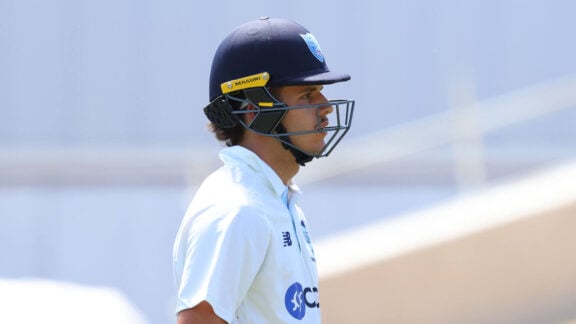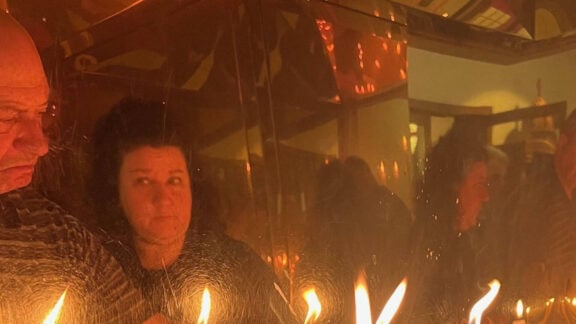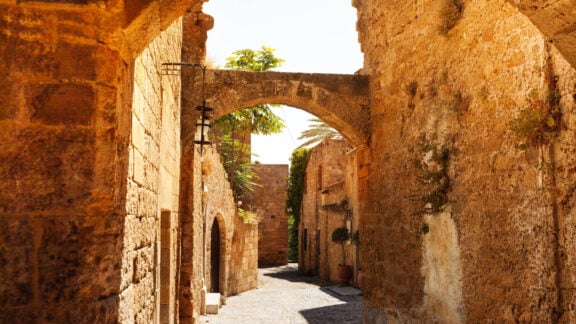Neos Kosmos sat down for an in-depth conversation with Victorian Premier Jacinta Allan on Wednesday, and no subject was off limits.
From the state’s challenging economic position — and what she says is a better outlook — to the pressures of land and payroll taxes, which many of our readers anguish over, and to the future of ethnic media and the position of Victoria’s Greek and multicultural creative sectors, the Premier opened the doors to her office — and spoke candidly.
However, yesterday Allan was dressed in black; it was not a good day. The premier had been grappling with the shocking allegations of child abuse by Joshua Dale Brown, who has been charged with 70 offences relating to eight victims at a childcare centre in Point Cook.
The alleged perpetrator worked across 20 Victorian childcare centres. The weight of it sits heavily on the Premier’s mind, as it does on all Victorians.
“Every parent, every grandparent, every Victorian has been asking that since the news broke,” she said.”It’s a powerful question, and a challenging one to answer.”
While not wanting to compromise the ongoing Victoria Police investigation, Allan pointed to what she sees as deeper systemic issues. The current national framework that governs childcare— “isn’t strong enough” she said.
Allan yesterday announced urgent state-led measures over the last two days.
“We’re not waiting for a national solution anymore. The national Working with Children Check is moving too slowly, so we’re creating a Victorian register — like what we have for teachers.
It will track every childcare worker across the state. You won’t have to go centre to centre anymore. It becomes systemic.”
The register will be in place within two months and the state is mandating a ban on mobile phones and personal devices in childcare centres.
It’s was voluntarily she said, but “now it will be mandatory”.
Overwhelmingly, the premier said child-care workers “are good people doing vital work”. “This case has horrified the entire profession.”
There are evident limitations in the Working with Children Check.
The alleged perpetrator had no priors she said.
“We’re strengthening the assessment process and introducing mechanisms to revoke certification if someone is banned from working in early childhood settings.
It’s about prevention — and it’s urgent.”
“Parents deserve to have confidence and trust in the system that cares for their kids,” Premier Allan told Neos Kosmos.

Managing state debt without sacrificing services
On Victoria’s state debt, Allan sought to offer reassurance and clarity. Her focus is on boosting productivity, addressing unfairness in the GST carve-up, and continuing reforms.
“We’re the only state with a published fiscal strategy post-COVID,” she said.
“We’re sticking to a five-step plan. Debt levels as a ratio are now stabilising and beginning to fall. And we’re delivering an operating surplus this financial year — only South Australia and Western Australia can say the same.
South Australia has a pretty skinny surplus, and frankly they’re not as big or as dynamic a state as we are. And Western Australia — well, that’s where they literally dig wealth out of the ground.”
Allan drew a sharp distinction with the Opposition, saying that unlike the Liberals her government “will not cut frontline services.”
“The very people concerned about debt and taxes rely on those services: child protection, education, healthcare, and community safety.”
Land and payroll tax pressures
Premier Allan acknowledged the concern among migrants, particularly Greek Australians, over land tax — especially for those who own one or two investment properties.
“For many, especially working-class families and migrants, wealth isn’t in stocks, it’s in their homes,” she said.
“I get it. The political answer is, ‘We’ve got nothing to announce today,'” the Premier said — but with a mischievous glint, she gave a subtle wink-and-nudge suggesting that something may be on the horizon.
Premier Allan said that the state “will make revenue adjustments, where we can.”
She pointed to the off-the-plan stamp duty concession for apartments, units, and townhouses.
“If you’ve got a bit of land and you want to subdivide it to put a couple of townhouses, we’re doing the off-the-plan stamp duty concession,” Premier Allan said.
As far as payroll relief, she noted that the threshold increase to $1 million is now in effect, “lifting the burden for 6,000 businesses.”
“And in regional Victoria, we already have the lowest payroll tax in the country.”
GST frustrations: “We’ve been short-changed”
Victoria’s long-standing grievances over the GST distribution remain front of mind for the Premier.
“We’ve been $31 billion behind since the GST was introduced,” Allan said.
As one of the “most productive” states in Australia, Premier Allan is keen to prosecute a case for harmonisation, reduction of red tape, and a fairer share of the GST carve-up.
Federal Treasurer Jim Chalmers has called for a productivity summit in Canberra, and the Premier is ready.
“We’re calling for a structured, federated approach to the productivity push.”
As she pointed out in the Australian Financial Review last month, “Victoria has a productivity plan of its own that we will bring to the table.”
Regulation and planning are key targets for the Premier, who said that “red tape continues to weigh down investment and innovation.”
“Victoria has committed to halving the number of state regulators by 2050, and we want to be part of the plan to reduce, harmonise and digitise regulation across the nation.
We’re a people-based economy — unlike Western Australia, where they dig wealth out of the ground.”
With the “no-worse-off” guarantee set to expire next year, Allan is ramping up her advocacy.
“We run the hospitals, schools, and police. You can’t have a national productivity conversation without talking about revenue reform.”
If Victoria had received its population share of federal infrastructure funding, the state would have gained $8.3 billion more over the past decade.
“The Metro Tunnel and West Gate Tunnel — transformative projects — received not a cent from the Commonwealth,” she said.

Justice reform and community safety
Many Greek and other ethnic communities are feeling the brunt of an increased rate of crimes against the person and property. In diverse areas, where more aspirational Greek, Italian, Chinese and Indian communities live, they feel even more vulnerable — particularly elders.
Allan addressed recent bail law reforms, acknowledging a troubling rise in serious repeat offending.
“Our laws are working. We’ve seen a 31 per cent year-on-year increase in people being denied bail,” she said.
“There are 609 more adults on remand this month. Community safety is the priority.”
The state is investing $727 million to expand the prison system and support Corrections Victoria staffing. But Allan insists prevention and rehabilitation remain part of the equation.
Greek and multicultural festivals, arts and media
The Premier was candid when asked why Greek and other arts and community festivals struggle for recognition within Creative Victoria’s broader funding structures.
Hundreds of professional and community performers, dancers, musicians, writers, and artists are presented by the Antipodes Greek Festival.
Just as important, many of Victoria’s leading Greek and other non-Anglo artists first found their feet in festivals like Antipodes.
“It’s a really good observation,” Allan said.
“Festivals like the Greek Festival may celebrate a particular culture and history, but they also share culture — and many artists start there.
I think about going to the Antipodes Festival at the start of this year, and there were as many non-Greek people as there were — Anglo, Asian, Middle Eastern, everyone was there.”
She believes the “performances are different” — at Greek and other multicultural festivals, they’re not the same as “going to the NGV and looking at French impressionists.”
“Regardless of where the bucket of money is coming from, what we will do is make sure we’re supporting the Antipodes and other festivals.”
Premier Allan acknowledged that there may be a “structural legacy” that excluded diverse communities from funding pipelines. She pointed to George Lekakis now heading a root-and-branch review of the multicultural sector.
“George Lekakis is leading a wide-ranging review, and we are looking at how the system evolved, and what needs to change.
These festivals aren’t just ethnic — they’re artistic, they launch careers, and they reflect modern Victoria.”
Neos Kosmos pointed out that the Immigration Museum has lacked focus over the last eight years years on immigration stories. Neos Kosmos and other ethnic media as well as communities took to media to express their concern in 2019.
Premier Allan promised to take concerns “on notice” about the museum’s “current lack of focus on immigration.”
“That’s something I’ll also raise with George [Lekakis], because I understand the importance of people knowing our history — and ours is a history of migration.”
When it comes to multicultural media, Premier Allan reaffirmed the government’s 15 per cent advertising target for the sector and said she wants to improve engagement across all departments.
“We’re now in conversation with DPC’s media buying team. Validation through ethnic media matters — it must be core to the conversation, not an afterthought.”








